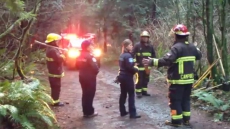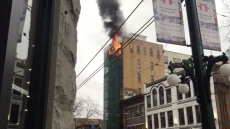TORONTO — The majority of Canada's provinces and territories have been assigned high marks on a new report card on history education.
Historica Canada looked at both social studies and history curricula from grades 7 through 12 across the country.
Ontario, British Columbia, Quebec and Manitoba topped the provincial rankings in the Canadian History Report Card, with each earning A- grades. Among the territories, Yukon was assigned A-, ahead of the Northwest Territories and Nunavut which both got B-minus.
It's a vast improvement from the 2009 report card, which focused solely on history courses offered from grades 9 through 12. Four provinces were assigned an "F" and none receiving an "A."
Evaluations were conducted for three main factors: curriculum content; development of critical and creative thinking skills; and the amount of mandatory Canadian history content at junior, intermediate and senior levels.
The report card noted that curricula changes in recent years "have demonstrated the need to better incorporate diverse perspectives," such as those focused on indigenous peoples, gender and women's history, and multiculturalism.
It also outlines recommendations for further improvements, such as mandating at least one Canadian history credit as a high school graduation requirement, and establishing a clear balance between national and provincial/regional history.
Here is the overview of final grades and percentages:

1. Ontario, A-, 82 per cent
2. British Columbia, A-, 81 per cent
3. (tie) Quebec, A-, 80 per cent
3. (tie) Manitoba, A-, 80 per cent
5. Newfoundland and Labrador, B, 75 per cent (anglophone) 74 per cent (francophone)
6. Nova Scotia, B-, 73 per cent (anglophone) 72 per cent (francophone)
7. New Brunswick, B-, 71 per cent (anglophone) 71 per cent (francophone)
8. Prince Edward Island B-, 71 per cent (anglophone) 70 per cent (francophone)
9. Saskatchewan, C+, 69 per cent
10. Alberta, C-, 62 per cent
1. Yukon, A-, 81 per cent
2. (tie) Northwest Territories, B-, 72 per cent
2. (tie) Nunavut, B-, 72 per cent




